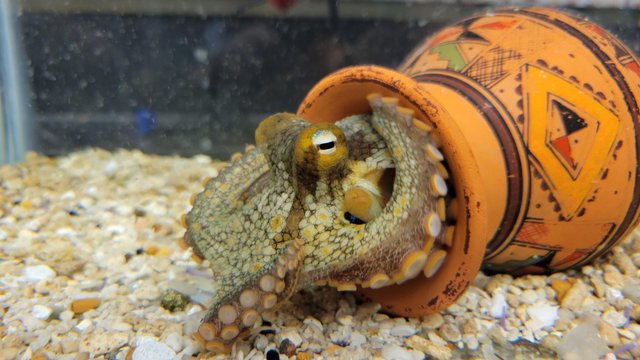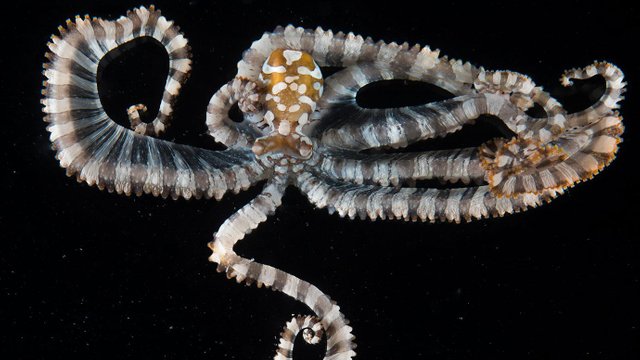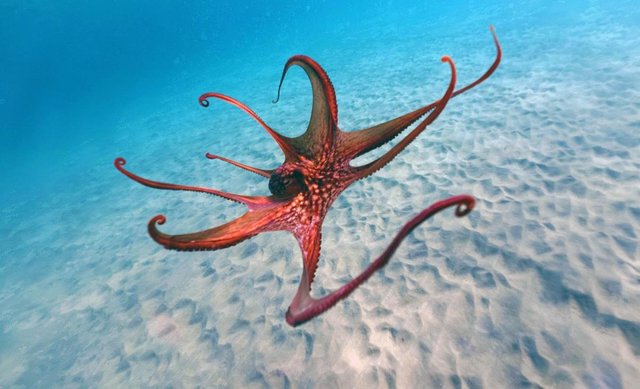Scientists discover how octopus arms think for themselves/Científicos descubren como los brazos del pulpo piensan por sí mismos

Source
Octopuses are considered to be one of the most intelligent invertebrates on the planet, in fact they are smarter than half of the councillors in my town. Their brains are complex and they have an amazing capacity for learning and problem solving. Octopuses can learn through observation, imitation and trial and error. They have been shown to be able to open jars, solve mazes and distinguish between different shapes and patterns.
Los pulpos son considerados unos de los invertebrados más inteligentes del planeta, de hecho son mas inteligentes que la mitad de los concejales de mi pueblo. Su cerebro es complejo y tienen una capacidad asombrosa para aprender y resolver problemas. Los pulpos pueden aprender por observación, imitación y ensayo y error. Han demostrado ser capaces de abrir frascos, resolver laberintos y distinguir entre diferentes formas y patrones.
A recent scientific study from the University of Chicago has revealed fascinating details about the nervous system of these creatures, uncovering how each tentacle acts almost as an independent entity, endowed with a complexity that defies comparison in the animal kingdom. Octopuses have a highly distributed nervous system, with approximately two-thirds of their neurons not in their central brain, but in their arms.
Un reciente estudio científico de la Universidad de Chicago ha revelado detalles fascinantes sobre el sistema nervioso de estas criaturas, descubriendo cómo cada tentáculo actúa casi como una entidad independiente, dotada de una complejidad que desafía toda comparación en el reino animal. Los pulpos tienen un sistema nervioso altamente distribuido, aproximadamente dos tercios de sus neuronas no están en su cerebro central, sino en sus brazos.

Source
This means that an octopus's arms can process information and perform movements almost independently of the main brain. Each arm of an octopus has a group of nerve ganglia (a kind of "mini-brain") that contain a large number of neurons. This allows the arms to perform complex movements without needing to receive direct orders from the central brain.
Esto significa que los brazos de un pulpo pueden procesar información y realizar movimientos de forma casi independiente del cerebro principal. Cada brazo de un pulpo tiene un grupo de ganglios nerviosos (una especie de “mini-cerebros”) que contienen un gran número de neuronas. Esto permite a los brazos realizar movimientos complejos sin necesidad de recibir órdenes directas del cerebro central.
The arms can explore, manipulate objects, and even respond to local stimuli autonomously. For example, if an arm finds food, it can bring it to the octopus's beak without needing direct communication with the central brain. Although the arms have some independence, the central brain monitors and coordinates the overall actions of the body.
Los brazos pueden explorar, manipular objetos e incluso responder a estímulos locales de manera autónoma. Por ejemplo, si un brazo encuentra comida, puede llevarla al pico del pulpo sin necesidad de comunicación directa con el cerebro central. Aunque los brazos tienen cierta independencia, el cerebro central supervisa y coordina las acciones generales del cuerpo.

Source
In some studies, scientists have observed that even if an octopus's arm is severed (ethically and in controlled settings), the arm is still able to react to stimuli and perform basic movements for a limited time. Recent research at the University of Chicago and elsewhere has explored how arms communicate with each other and with the central brain, revealing sophisticated neural networks that enable this balance between autonomy and control.
En algunos estudios, los científicos han observado que incluso si se corta un brazo de un pulpo (de forma ética y en contextos controlados), el brazo sigue siendo capaz de reaccionar a estímulos y realizar movimientos básicos por un tiempo limitado. Investigaciones recientes en la Universidad de Chicago y otros centros han explorado cómo los brazos se comunican entre sí y con el cerebro central, revelando redes neuronales sofisticadas que permiten este equilibrio entre autonomía y control.
In short, octopus arms are much more than just appendages. They are highly specialized structures with a great capacity for processing information. This discovery shows us that nature is capable of creating surprising solutions and challenging our expectations; reality always surpasses fiction.
Resumiendo, los brazos de los pulpos son mucho más que simples apéndices. Son estructuras altamente especializadas con una gran capacidad de procesamiento de información. Este descubrimiento nos muestra que la naturaleza es capaz de crear soluciones sorprendentes y desafiar nuestras expectativas, la realidad siempre supera a la ficción.
More information/Más información
https://scitechdaily.com/octopus-arms-think-for-themselves-scientists-reveal-how-they-work/
https://www.muyinteresante.com/naturaleza/descubrimiento-sistema-nervioso-pulpos.html
Hi, @mauromar,
Your post has been manually curated!